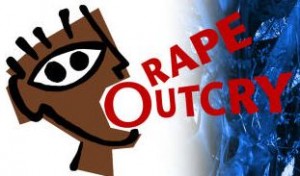Since the beginning of time, rape (and other forms of sexual violence such as sexual torture, sexual slavery, forced prostitution) has been used as weapons of and in war. From conflicts in Bosnia Herzegovina, Rwanda, Liberia, Congo and Darfur, rape has been repeatedly used to shame and psychologically traumatize victims.
The world is aware of girls and women as the usual victims of rape in conflict zones. Statistics are easily available for female victims of sexual violence in war zones or in military occupation. Report by the Special Rappoteur on Rwanda estimates that 50,000 and 500,000 Rwandese women and girls were raped during the Rwanda genocide. Recent report on Congo found that more than 400,000 women were raped in a 12-month period in 2006-07, which roughly equates to 1,152 women were raped every day between during that time frame – a shocking rate of 48 per hour. As a result, there are myriad of international organizations funded, equipped and trained to deal with rape of women. However, not many people are aware of male rape or how prevalent it is. Very few organizations are equipped to offer help to men who have been raped or experienced other forms of sexual violence.
Hundreds of thousands of men have been raped by other men. Some of them have been gang-raped repeatedly and over a period of many years. Rape of men is not a new occurrence but, so far, it has been under-discussed and under-researched. A recent Guardian article narrates the harrowing experience of Congolese refugees who were repeatedly raped when they were captured by rebel group – some were brutalized for many years. In Eastern Congo, 30% of women and 22% of men reported being victims of sexual violence. One victim who confided in a doctor was only given Panadol. The article notes incidences of male rape during conflicts in countries like Chile, Greece, Croatia, Iran, Kuwait, the former Soviet Union and the former Yugoslavia. During the Sri Lankan civil war, 21% of rape victims were male. 80% of Bosnian males imprisoned in concentration camps and 76% of El Salvadoran male political prisoners reported sexual abuse.
Why male rape?
Raping of men, in a certain symbolic way, constitute more of a power play. For most men the idea of being a victim is hard to handle. Beliefs about ‘manliness’ and ‘masculinity’ are deeply ingrained for most men and can lead to intense feelings of shame, inadequacy or guilt. Most telling but not surprising, these men are referred to as “women”- a shaming tactic of the man for playing, albeit forcibly, a woman’s role in being penetrated. It is this forced revocation of the masculine identity, coupled with the taboo of this particular act of sexual violation that makes male rape carry an extra dose of shame and the reason why men do not report incident of rape or seek for help post-trauma. This culture of silence by both the victim and assailant makes cases of male rape particularly disturbing and difficult to stem.
Most countries do not criminalize sexual abuse of men, therefore, systematically refusing to protect victims. This indirectly facilitates and fosters a culture of impunity for perpetrators and ignoring male rape victims. This public manifestation of impunity does not end with states; sadly, many international and aid organizations are falling short. Due to lack of data and discussion on this issue, many international organizations do not talk about it. There are dozens of references to “violence against women” in United Nations human rights resolutions, treaties and agreements, but most don’t mention sexual violence against men. Most of the funds and public discourse are directed to only female victims while ignoring and neglecting men.
In the inaction(s) of States and international organizations a thread of commonality emerges: the belief that no one will be held accountable for these vicious acts and violent crimes. It reinforces that belief that equates ‘female’ with ‘victim’, thus hampering our ability to see women as strong and empowered beings. It also underscores the unhealthy expectations of men by the society and their assumed invulnerability.
What should be done?
Talking about sexual violence is never easy. Whether you are a man or a woman, sexual violation is traumatic. However, the world cannot sit back and watch victims suffer in silence. There needs to be law in place that makes abuse of men illegal. INGOs, lawyers, health experts and human rights activists must insist on a broader definition of rape and sexual violence that includes both genders whilst penalizing the perpetrators.
The world needs to provide medical resources and psychological support to men while ensuring that perpetrators are held to account. Dealing with the consequences of sexual violence can be hard work but people do recover. The world should not, due to strict definition of gender roles and myopic interpretation of violence, deny support to men who demonstrate the courage to come forward in reporting such crimes.

I think sometimes that the media focuses on women and children because they think it will work on people’s heartstrings more than men being affected. The default for most people is to see men as the perpetrators when that really isn’t the case all the time. Thanks for bringing this up and talking about it. Very important.